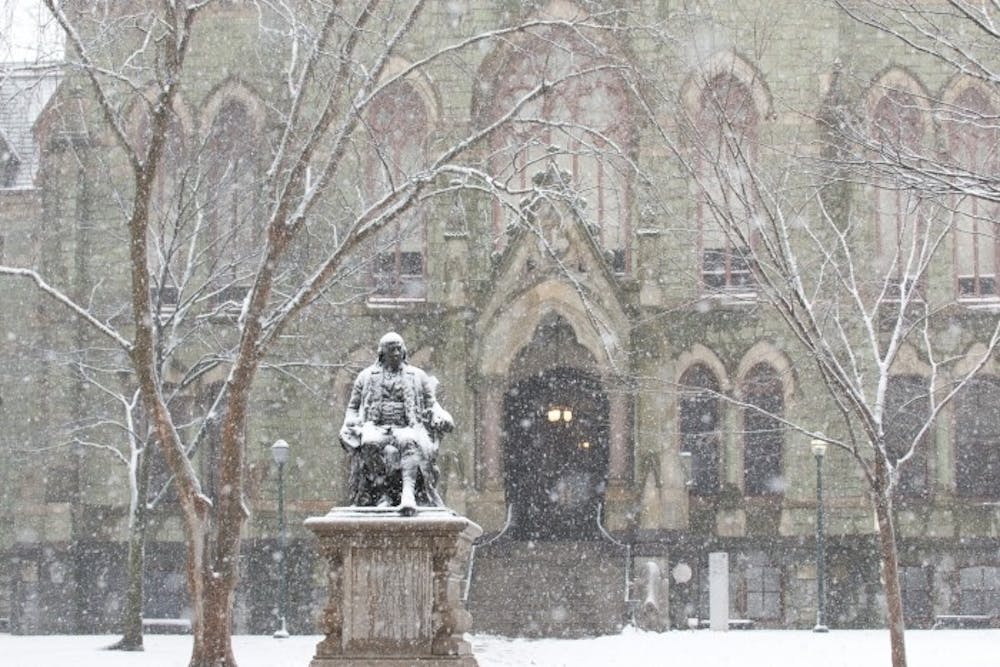Some universities call it "Winter Study." Others call it the "Winter Term" or "Intersession." Whatever one calls it, that short period between the fall and spring semesters — when students can take classes, pursue internships, or study abroad — will not be offered at Penn anytime soon.
Despite the winter session's popularity at other institutions like Williams College, Middlebury College, and Johns Hopkins University, Dean of the College of Arts and Sciences Paul Sniegowski said little support exists for the program among Penn faculty.
Penn's winter breaks are among the shortest of its peers', primarily due to Pennsylvania state law mandating a certain amount of class sessions per term and the University needing classes to end early enough for the Penn's summer session to begin. During the 2017-2018 winter break and the 2016-2017 winter break, Penn students had 19 days off.
Students have criticized this practice in the past as detrimental to campus efforts to foster student mental health.
At other universities, the winter sessions vary in rigor and in popularity. Depending on the university, classes offered during the interim session include a range of topics such as photojournalism, biochemistry, and wellness.
At Williams, students are required to participate in the Winter Study program every year, but are only required to remain on campus their first year.
Williams freshman Sam Wolf said, for the most part, Winter Study classes tend to be less academically rigorous. All of the courses are graded on a pass/fail basis and do not count toward a specific major, which he said reduces stress for many students.
Wolf is currently enrolled in a political science course entitled "War Games," in which students play board games and participate in online programs that simulate various aspects of warfare. One student Wolf knows spent Winter Term hundreds of miles from campus researching the best bagels in different New York City neighborhoods.
Williams has a wine tasting course offered during the school's Winter Study term that is so popular that its enrollment is restricted to only students with high GPAs. ("There's so much demand," Williams freshman Sam Wolf said.)
Winter Study "has the potential to get people to take new classes for the regular fall or spring term that they wouldn’t have thought about taking," Wolf said. He added that students may be more willing to be intellectually curious during Winter Study than they would be during the more rigorous fall and spring semesters.
Niko Carvajal, a sophomore at Middlebury College, said students are only required to participate in the school's Winter Term for two years. Unlike at Williams, Winter Term classes can count toward a major.
For students at Johns Hopkins, all courses offered during Intersession are optional. The courses still count for credit but are taken pass/fail. Gurion Marks, a junior at Johns Hopkins, is currently using his term to shadow a doctor at Mount Sinai Hospital.
"There has been some discussion of a Penn [winter] term at times in years past," Sniegowski wrote in an emailed statement, but "there is currently no ongoing consideration of the possibility.” He continued, “Approval of a [winter] term at Penn would require broad support from the faculty.”
In a separate statement emailed hours after his first, Sniegowski said he had heard a top administrator mention the possibility of such a program years ago, but remembers it not receiving much support.
"There is no record of the substance of conversations about it at that time," he wrote. "I can’t really speak to faculty or administration opinions about it then."
At Penn, many student groups — including affiliated sororities and The Daily Pennsylvanian — require members to come back to campus early for training, recruitment, and other activities. Wolf said at Williams, the Winter Study term is convenient for students in extracurricular activities that require them to return to campus early.
"A big part of the school’s intention is to just get people interacting socially," Wolf said, "kind of more outside [the] academic framework."
“This is the happiest time of the year for most of us.”



